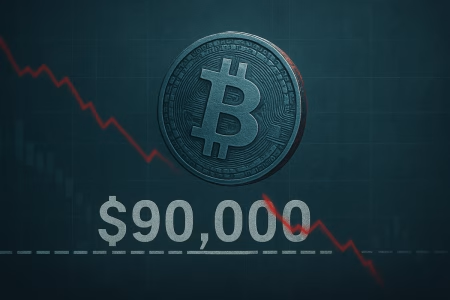Crypto Markets Drop as Investors Eye House Vote and Inflation Data
Crypto Markets – In recent weeks, the cryptocurrency market has faced significant headwinds, culminating in a notable decline as investors turn their attention to critical political developments and economic indicators. As anticipation builds around an impending House vote and upcoming inflation data, market participants are adjusting their strategies. This article explores the implications of these developments on the crypto landscape, providing insights into trends, investor behavior, and future outlook.

The Current State of Crypto Markets
Overview of Market Performance
As of [insert date], the cryptocurrency market has experienced a noticeable downturn. Major cryptocurrencies such as Bitcoin, Ethereum, and others have seen their prices dip significantly. Here are some key statistics:
- Bitcoin Price: $[Insert Current BTC Price] (down X% from previous week)
- Ethereum Price: $[Insert Current ETH Price] (down Y% from previous week)
- Market Cap: $[Insert Current Total Market Cap]
This decline can be attributed to investor sentiment as they closely monitor political developments in Washington and prepare for economic data that could impact monetary policy.

Key Contributors to Market Decline
Several factors have contributed to the recent downturn in crypto markets:
- Political Uncertainty: The upcoming House vote on a significant piece of legislation has created unease among investors.
- Inflation Concerns: With inflation data set to be released soon, traders are wary of potential shifts in Federal Reserve policy.

Understanding the House Vote and Its Implications
Details of the House Vote
The House is set to vote on [insert specific legislation or topic], which carries implications for the broader economic environment. This legislation could influence fiscal policy, government spending, and regulatory frameworks that directly impact the cryptocurrency market.
- Relevant Date: [Insert House Vote Date]
- Expected Outcomes: Discuss the potential outcomes and how they might affect the cryptocurrency landscape.
Historical Context
Historically, legislative developments in the U.S. have had significant effects on financial markets, including cryptocurrencies. For instance, when Congress passed the [insert relevant legislation or act], crypto prices responded positively due to increased regulatory clarity. Conversely, uncertainty around regulation can lead to declines as we are witnessing currently.
The Role of Inflation Data in Shaping Market Sentiment
Importance of Inflation Data
Upcoming inflation data is of paramount importance to the crypto markets. Increases in inflation can lead to higher interest rates as the Federal Reserve responds to rising prices. Here’s a closer look at why this data matters:
- Interest Rates: Higher interest rates typically increase the opportunity cost of holding non-yielding assets like cryptocurrencies.
- Investor Behavior: In times of high inflation, investors may flock to traditional hedges, such as gold, instead of cryptocurrencies.
What to Watch For
Investors should pay attention to specific indicators, including:
- Consumer Price Index (CPI): A key indicator of inflation, released monthly.
- Producer Price Index (PPI): Reflects changes in profit margins and cost to consumers.
Market Reactions to Previous Inflation Reports
Historical Trends
To understand how inflation data impacts crypto markets, let’s look at how the market reacted during previous inflation reports:
- Example 1: Following a particularly high CPI report in [insert month/year], Bitcoin fell by X%.
- Example 2: Conversely, when inflation figures were lower than expected, Ethereum surged by Y%.
This historical context provides insights into potential future market behavior.
The Market’s Emotional Response: Fear and Uncertainty
Fear and Greed Index
The emotional response of investors can significantly influence market movements. The Fear and Greed Index, a tool that gauges market sentiment, has shifted towards fear recently. This shift often leads to increased selling pressure, further driving down prices.
- Current Fear and Greed Index Value: [Insert Value]
- Analysis of Market Sentiment: Discuss the implications of the current index on crypto market performance.
Investor Sentiment Analysis
Various tools and surveys can gauge investor sentiment toward cryptocurrencies. Social media platforms, trading forums, and sentiment analysis tools can provide insights into community reactions to market events, including the House vote and inflation data.
Strategies for Navigating the Current Market
Risk Management Techniques
For those invested in cryptocurrencies, it is vital to implement effective risk management techniques. Strategies include:
- Diversification: Don’t place all your investments in one basket; consider spreading across multiple cryptocurrencies.
- Stop-Loss Orders: Setting stop-loss orders can help protect investments from severe downturns.
Timing the Market
While timing the market can be challenging, staying informed about economic indicators can provide an edge. Consider dollar-cost averaging to mitigate the volatility of crypto investments.
What Lies Ahead: Future Outlook for Crypto Markets
Anticipating Market Movements
As investors await the House vote and inflation data, it’s essential to remain vigilant. These developments could drive significant shifts in the crypto landscape.
- Potential Scenarios:
- If the House passes favorable legislation, it may boost investor confidence, leading to a rebound in crypto prices.
- If inflation data points to increases, it could further depress crypto values.
Expert Predictions
While predictions are inherently unpredictable, market analysts are watching trends closely. Many experts believe the key to future bullishness in the crypto market may hinge on regulatory clarity and economic stability.
Conclusion
Summary of Current Market Conditions
In summary, the recent decline in crypto markets reflects a complex interplay of political developments and economic indicators. As investors focus on the House vote and inflation data, understanding these dynamics is crucial.
Final Thoughts
For long-term crypto investors, patience and vigilance are key. By monitoring both legislative and economic factors, investors can position themselves to navigate the volatile crypto landscape effectively.
Call to Action
Stay updated on the latest developments by following Trading Market Signals for expert insights and analysis on the crypto markets.
Outgoing Links
- CoinMarketCap for real-time crypto market data
- Investopedia for additional insights on investing strategies.
Internal Links
- For deeper insights, visit our Crypto News Section.








